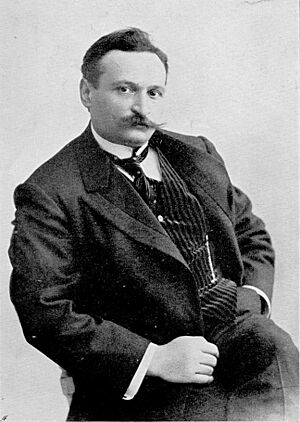Tevfik Fikret facts for kids
Quick facts for kids
Tevfik Fikret
|
|
|---|---|
 |
|
| Born |
Mehmed Tevfik
December 24, 1867 |
| Died | August 19, 1915 (aged 47) |
| Resting place | Aşiyan Asri Cemetery |
| Nationality | Ottoman |
| Alma mater | Galatasaray High School |
| Occupation | Educator, poet |
| Known for | Founder of the modern school of Turkish poetry |
| Spouse(s) | Nazime (married 1890) |
| Children | Haluk (1895–1965) |
| Parent(s) | Hüseyin Efendi (father), Hatice Refia Hanım (mother) |
Tevfik Fikret (Ottoman Turkish: توفیق فكرت) was the pen name of Mehmed Tevfik. He was born on December 24, 1867, and passed away on August 19, 1915. He was an important educator and poet from the Ottoman Empire. Many people see him as the person who started modern Turkish poetry.
Contents
About Tevfik Fikret
His Early Life
Mehmed Tevfik was born in Istanbul on December 24, 1867. His father, Hüseyin Efendi, was often away. This was because he was sent away from the city for disagreeing with the government. His mother, Hatice Refia Hanım, was from the island of Chios. She passed away when Tevfik Fikret was very young. His sister also died at a young age.
School Days and Teaching Career
Tevfik Fikret went to the famous Galatasaray High School. He was a brilliant student and finished at the very top of his class in 1888. Later, he even became the principal of this school.
In 1890, he married his cousin, Nazime. They had a son named Haluk in 1895. In 1894, he left Galatasaray. He then started teaching at another well-known school, Robert College, in 1896. He taught there until he passed away. In 1906, he built a house for his family inside the Robert College campus. This house was called Aşiyan, which means "nest." Today, it is a museum.
His Career as a Writer
Tevfik Fikret was very active in the world of writing. In 1894, he started a magazine called Malûmat. In 1896, he became the main editor of Servet-i Fünun. This magazine was known as "The Wealth of Knowledge." Its goal was to make the Ottoman language simpler. He worked with other famous Ottoman writers there. He kept writing for Servet-i Fünun until 1901. At that time, the Ottoman government banned his writings.
After the Young Turk Revolution in 1908, he started a newspaper called Tanin. This newspaper strongly supported the ruling political group. He also wrote for a women's magazine called Mehâsin. However, he eventually became unhappy with the government's actions. He went back to Galatasaray High School as the principal. But in 1909, during a time of political unrest, he protested by chaining himself to the school gates. He resigned from his job that same day.
He had plans for a new school and more magazines. Sadly, he had diabetes and refused to get treatment. He passed away in 1915. He was buried in his family's burial ground in Eyüp. Some of his well-known poetry books include Rubab-ı Şikeste ("The Broken Lute") from 1900 and Haluk'un Defteri ("Haluk's Notebook") from 1911.
Standing Up for Freedom
Tevfik Fikret is remembered for supporting free speech and a constitutional government. This means he believed people should be able to speak their minds. He also thought the government should follow a set of rules. He openly criticized the ruler of the Ottoman Empire, Abdul Hamid II. Because of his strong opinions, the government censored his works in 1901. This meant they stopped his writings from being published.
In 1902, he published a collection of poems called Sis ("Fog"). These poems spoke out against dictatorships and unfair governments. The Ottoman police investigated him many times. This was because of his political views and writings. He was also friends with other writers who opposed Abdul Hamid II. Because of his powerful poems and writings against the government, he became known as the "freedom poet." Tevfik Fikret also believed in a wider view of the world. He wrote, "My homeland is the world and my nation is humanity."
His Lasting Impact
Tevfik Fikret is seen as the father of modern Turkish poetry. He believed that good poetry came from skill and knowledge, not just from sudden inspiration. Like many classic Turkish poets, he used his deep understanding of Turkish music when he wrote his poems.
 | Frances Mary Albrier |
 | Whitney Young |
 | Muhammad Ali |

